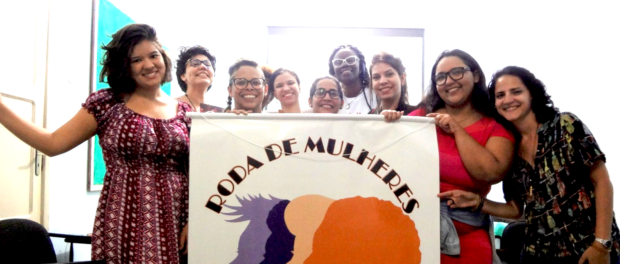
Saturday, July 13th, a roundtable titled “Women in Baixada Politics” took place at the headquarters of the State Union of Education Professionals (SEPE) in the city of Duque de Caxias, in Greater Rio de Janeiro’s Baixada region. The discussion, organized by the Young Women’s Group at the House of the Working Woman (CAMTRA) included feminist collectives from Magé (also in the Baixada) as well as Caxias, providing space for debate on the themes of access to rights and the political participation of women from the periphery. The event, part of the Young Women’s Group’s efforts to decentralize CAMTRA’s feminist action, also allowed the various women present to share their diverse experiences of political participation in the Baixada.
For Larissa Urbano, a psychologist and resident of Caxias, and an integral member of CAMTRA’s Young Women’s Group, people know very little about what happens in the Baixada. There is little awareness beyond the already known structural problems, such as a lack of public security, especially in places like Belford Roxo, and barriers to urban mobility.
For Yasmin Bitencourt, a researcher from the Institute of Alternative Policies for the Southern Cone (Instituto PACS), women from Caxias are able to engage in politics because of the historic struggle of educators throughout the city. Since her mother is a municipal teacher, Yasmin—who is also a part of the Young Women’s Group—affirmed that “education is a space where women have the freedom to build what they believe.”
The event’s participants also discussed the victories of women from the region throughout history, especially through the Baixada Women’s Forum, which includes participation from education professionals and feminist activists in the region. Among the Forum’s successes was the construction of the Municipal Policy Plan for the Women of Duque de Caxias, which brought visibility to, among other things, the lack of maternity wards in the city. Today, the city is constructing a new maternity ward in the Caxias neighborhood of Santa Cruz da Serra.

For Rose Cipriano, a teacher and participant in the Baixada Women’s Forum and the Baixada Girls’ Collective, feminism in the periphery needs to be organized differently and carried out in a different format. The teacher noted that many of her students held feminist attitudes, but they would not label themselves as such. After all, “the saying ‘my body, my rules’ in a favela like Parque das Missões [in Caxias], for example, is impossible because walking around in short-shorts means running a real risk of being raped,” said Cipriano.

Júlia Azevedo, a resident of Magé, focused on infrastructure and mobility. The 22-year-old member of the Baixada Women’s Roundtable collective said that the cost of public transportation is a major barrier for women in the Baixada, limiting their access to spaces of leisure and culture, as well as for participating in political activism. “For me to get to [downtown] Rio, I need R$20. No exhibit at the Banco do Brasil Cultural Center is free for me. I couldn’t make it to the protests against education cuts because I didn’t have the money to get there,” Azevedo lamented.

Bia Carvalho, a journalist and entrepreneur, spoke about her job and political work. Carvalho pointed out that journalism courses train professionals to work exclusively in large media institutions. Once she realized this, she resolved to do something different, since traditional media privileges a perspective that erases the subjects and narratives of the periphery—especially women. With this in mind, she created Women Up Front (Mulheres de Frente), a project to provide digital media consulting for women of the periphery. “I am going to take this on. I will use this [means of] communication to politicize other women,” she asserted.

The day ended with questions regarding the electoral process and the participation of women, principally regarding the situation of feminist candidates in the Baixada Fluminense. For Rose Cipriano, who ran as a candidate for State Representative in the 2018 elections and received more than 17,000 votes, “Institutional policy is a challenge for all women. To be a candidate from a left-wing party in the Baixada is to deconstruct the machismo present in institutions, but above all, to confront this triad: patriarchy, Coronelism, and conservatism,” concluded Cipriano.




